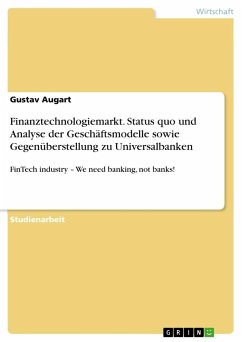Bachelor Thesis from the year 2016 in the subject Business economics - Banking, Stock Exchanges, Insurance, Accounting, grade: 1,3, University of Frankfurt (Main) (Fachbereich für Wirtschaftsinformatik), language: English, abstract: The thesis focuses on how Fintechs are disrupting the financial retail banking industry and how banks react to these changes. In this context, challenges and opportunities of their actions will be analyzed and discussed. Furthermore, it will be derived how aspects of innovation influence the Fintechs success in this process and how innovation takes place in the financial industry in general. Finally, this thesis discusses the implications of the current situation for both Fintechs and banks, and identifies potential outcomes and consequences for all involved parties. Since the beginning of the 21st century and the spread of the internet whole industries have been transformed or became obsolete. Disruption in the form of digitalization has taken place in the music, book, media and movie industry. Online and mobile services, offered by start-ups and technology companies are changing one industry at a time. Retail-focused companies like Apple, Netflix, Google, Amazon and Twitter have changed the way people think and use music, films, books and media. They also changed the consumers' general perception of good service, usability and of how companies are doing business. Despite all these improvements in our everyday life, the financial retail banking industry has remained relatively constant, even though it caused people to adapt to new circumstances, in the form of the Global Financial Crisis (GFC), resulting in a Global Recession and higher regulations for the industry. Since then, the industry missed the opportunity to regain the customers' trust by changing their habits and improving their services. Instead, customers are increasingly unlikely to buy products or refer their bank but are increasingly prepared to leave their bankwithin the next six months. This state of stagnancy inside the financial retail banking industry seems to have changed. New entrants have caused uproar in the industry. Fintechs, an acronym for financial technology, are entering the retail market, forcing banks to adapt and innovate. Online and mobile banking services are now considered to be the future of financial retail banking. Fintechs threaten to take away customers by offering better and cheaper services with higher usability. As both the number of Fintechs and their customers increase, banks realize that Fintechs are going to be a threat for them.








